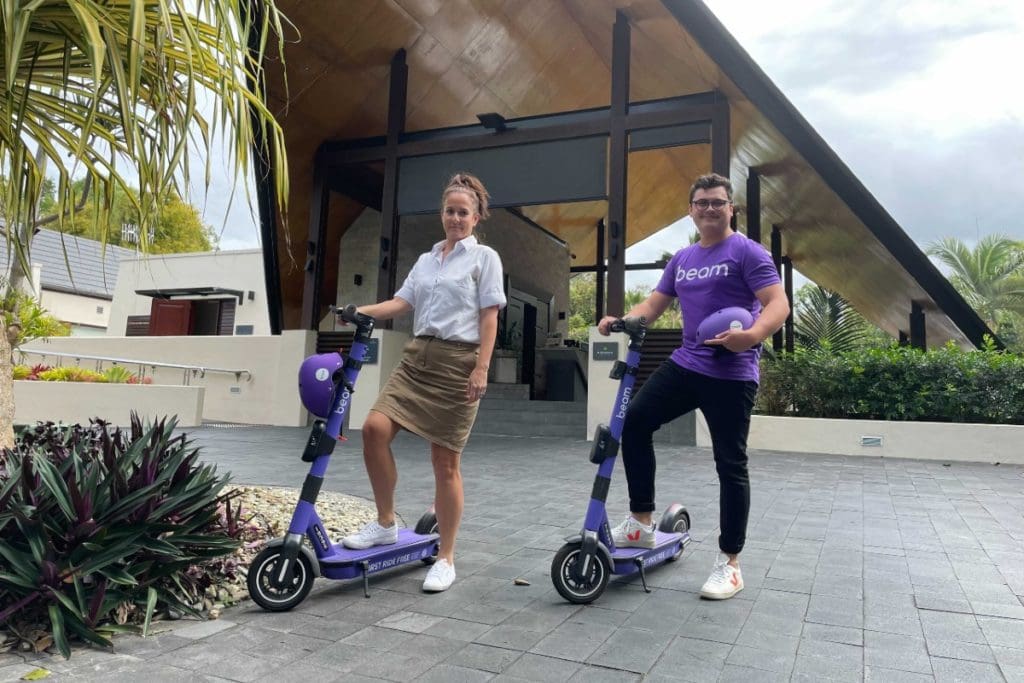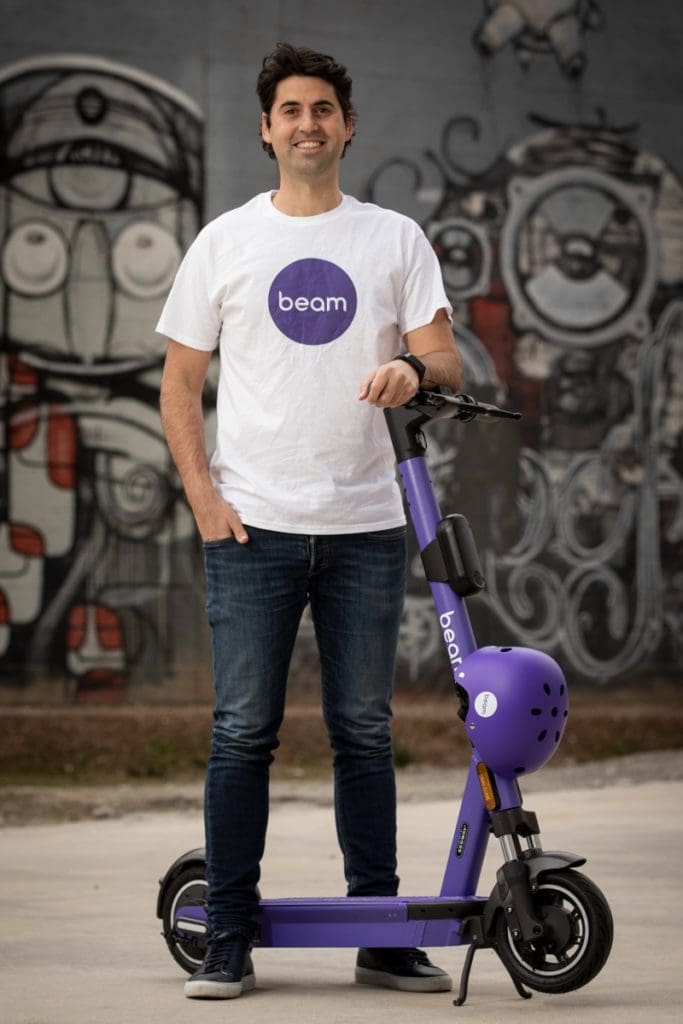Beam is Focused Upon Our Region

Port Douglas, Queensland
The world of bike and scooter share scheme operators has been like the wild west over recent years. Companies have started with a bang, then been refuelled by huge injections of venture capital, but in some cases, have ended with a whimper.
In terms of global size and active country count, Beam is not in the same league as Bird, Lime or some of the other current high flyers. But Beam has tightly focused its operations on countries in the Asia Pacific (APAC) region. In particular, Australia and New Zealand are a central part of Beam’s focus.
We recently caught up with Beam’s General Manager for Australia and New Zealand, Tom Cooper, who shared candidly about Beam’s current and future ambitions in our region.
But first, some background. Beam was founded by Yale University (USA) classmates Alan Jiang (who is CEO) and Deb Gangopadhyay (who is Chief Technology Officer (CTO)) in 2018.
They originate from Singapore, grew up, and live in the USA, but chose to headquarter Beam in Singapore.
Jiang previously led Southeast Asian operations for Ofo and was Uber’s Indonesian Country Manager.
On 23rd October 2018, Beam raised US$6.4 million (A$8.8 million) seed funding from Sequoia, Founders Fund, and ZhenFund. This was followed on 4th March 2020 by US $1 million (A$1.4 million) Series A funding, then on 1st June 2020 with US$26 million (A$38.6 million) in Series A funding. This round was led by Sequoia India, Hana Ventures, and Right Click Capital, an Australian-based venture capital fund.
Beam said that the funding would be used to support expansion in the APAC region, including in Australia, New Zealand, Korea, Malaysia, and Taiwan.
Rather than seeing scooters strewn across streets and parks, Beam has a ‘virtual docked’ model, with riders rewarded for parking in predetermined spots.
“Beam has to work as hard to limit the downsides of e-scooters for non-riders as they do to enhance the upside for riders,” said co-founder Deb Gangopadhyay in a statement.
On 11th May 2021 Beam announced a partnership in Australia with mobility as a service (Maas) software provider Moovit to enable Beam customers to see where their e-bikes and e-scooters can be found in real-time, initially in Canberra and Sydney, but with other cities to soon follow.
Beam reached 10,000,000 rides on 27th May 2021. These have been spread across Malaysia, South Korea, Australia, New Zealand, Thailand, and Taiwan
Tom Cooper has been with Beam since mid-2020 and in the micromobility field for 3 ½ years, which makes him an industry pioneer by micromobility standards.
He began by explaining how he got into the industry.
“I’d just sold a business and was having some time off,” Tom recalled. “I’d been in London a few months earlier and riding around London I got a feel for what docked bike share was.
“I was amazed at how much I more I saw of London by not riding the Tube or in a cab. I thought, ‘This is a really neat system!’ The London bike share system is obviously one of the best.
“Then I came back to Melbourne, this was 2018 and scooters were just starting to kick off. Some friends called and said, ‘Hey, we’re starting an e-scooter business. Do you want to come and have a look?’

“At the time I wasn’t convinced, but then I went down, spent a day with them, rode a scooter, and from that point on, I was hooked. I realised how transformational these devices could be and how they could open up cities and really integrate, particularly into places like Melbourne.”
The company Tom’s friends were starting was called Ride, which held one of the initial e-scooter share licenses for Adelaide. After working for Ride, Tom left to join Beam, then soon after Beam acquired Ride in June 2020.
At the time of writing, Beam are operating fleets of both e-bikes and e-scooters in Brisbane and Auckland, e-scooters only in Adelaide and Canberra, Bunbury WA, Townsville Qld and Wellington in NZ, plus e-bikes only in Sydney since 2020,
They’ve just announced their launch in Port Douglas Qld – you can see more details about this at the bottom of this article.
“We’ve got a few more coming online in the next month or so as well,” Tom revealed. These include Magnetic Island which is a popular tourist destination just off the coast of Townsville and James Cook University, on the outskirts of Townsville.
“We’ve just reached 28 staff across Australia and New Zealand,” Tom summarised. “We’ve got just over 6,000 vehicles active across Australia and New Zealand. We operate around 1,200 bikes, plus scooters.”
The Australian and New Zealand operations currently comprise about 15% of Beam’s total fleet of 40,000 vehicles, with South Korea being their biggest market.
Product Refinement
One of the challenges for share scheme operators has been the durability of their vehicles. If their scooters or bikes only last a few months in their rugged 24/7 outdoor use and abuse life cycle, then not only is that bad for the environment, it makes the operator’s financial model unsustainable.
Whilst Beam does not manufacture their own products, they have products made for their exclusive use.
“We use the largest OEM (original equipment manufacturer) in the world, Ninebot,” Tom revealed. “All our vehicles have been Ninebot from day one. We work with them closely. We appreciate that they spend tens of millions of dollars on R&D.
“We recently launched Gen 5 in Brisbane. They’re getting really robust. From where we came three years ago, to where we are now, they’re completely different machines. When we started they were only lasting three months, now we’re expecting upwards of four years.”
As to what lifespan is the break-even point for share scheme operators, Tom said that about 12 months is a fair indication.
“We’re doing a lot better than that,” he said. “Our vehicles contain significant technology, not just aesthetics but internally.”
Eyes on Expansion
“We’re open to expanding everywhere,” said Tom. “There’s a fair bit happening in Queensland right now, but three of the biggest cities in Australia don’t have micromobility (in the form of e-scooter share schemes) currently. Those being Sydney, Melbourne and Perth.
“We imagine that Melbourne and Perth will open up in the next six months. Sydney is currently a little bit slower.
“We hope in time there will be an opportunity for a trial in NSW. We were disappointed that they decided not to go ahead with a trial this year. We’d worked quite closely with the department of transport over the previous 12 months to work towards a trial. But we understand the Minister’s view. We hope over time to be able to educate and show some of the improvements in micromobility.
“But there’s still a lot of opportunities. Hobart and Launceston are currently in tender. And there are some regional centres in Queensland that are also looking at tenders. Overall the opportunity in Australia is really strong.
“In New Zealand, it’s a smaller market in terms of population but it’s been proven to be a really good market.”
Unlike some other share scheme companies, that are developing sales of bikes and scooters to private buyers as a second income stream for their business, Beam is focused upon operating share schemes. But there is a small exception, currently operating in Wellington, NZ, where Beam are selling their second-hand fleet to private buyers.
“It’s more or a sustainability sideline,” Tom explained. “These vehicles are refurbished and they find a new home. They’re perfectly good for day-to-day use. The last thing we want to do is just throw them out. Some are rebranded to be ‘Beam Solo’ so that people know that they’re not a for-rent vehicle.”
Instead, Beam is looking for growth by staying focused on its core geographic market, including Australia and New Zealand and growing its share fleet within that market.
“I think we could easily be up over 20,000 vehicles across Australia and New Zealand,” Tom predicted. “We’re only starting to scratch the surface. For example, Adelaide started at 500 vehicles. Then they’ve gone up to 1,000 and now they’re close to 2,000. Brisbane’s exactly the same. They started with 500, then 1,000 and are now at 2,800.
“If you look at the population densities of cities across the world and share vehicles per capita: Beijing, which is one of the world’s most densely populated cities has one vehicle for every 25 people. Then you go to places like Austin Texas, Tel Aviv Israel, they’ve got one vehicle for 60 people.
“At the moment Brisbane is at one vehicle per 800 and Adelaide is at a similar sort of level. If we start towards higher caps of vehicles, then 20,000… 25,000 isn’t out of the question.”
In most markets, Beam is seeing two or more rides per vehicle per day, which Tom says is a financially sustainable level.
Of course, the elephant in the room when it comes to increasing ridership, particularly in Australian cities is our car-centric urban design and relatively hostile environment for bikes and scooters particularly away from coastal and riverside shared paths and other rare exceptions to our busy, high-speed roads.
Tom is quite pragmatic when assessing the current level of positive impact upon infrastructure provision that Beam is currently making.
“So far it’s a small one,” he said. “Probably where we’re having an impact is the amount of data we’re able to give Councils now. They’re able to see where people are riding, where people are starting and ending trips. They can see what the potential future looks like.
“We’re probably very early in that conversation. It takes a lot of time and money to build infrastructure. So the effect that we’re having now, although small, will help to start formulating their decisions.”
Beam Launches in Port Douglas
Beam commenced operations in Port Douglas in late August 2021. Port Douglas is a popular tourist town in far north Queensland located on the coast, 66 km north of Cairns.
Beam has partnered with resorts and hotels to allow access to Beam’s e-scooter fleet, providing affordable and eco-friendly transport for visitors and locals alike.
The minimum riding age will be 16 years or 12-plus with a parent or guardian. Every ride will be covered by Beam’s personal accident insurance.
Beam General Manager (ANZ) Tom Cooper said, “We’re also excited to introduce some other micromobility firsts to Port Douglas, including our ‘Beam Booster’ program supporting local business owners by driving visitor traffic to their businesses.”
The Beam Booster program is to assist local shops, restaurants and cafes as they strive to reinvigorate their businesses post COVID-19. Beam’s proprietary partnership platform utilises a blend of GPS technology, in-app notifications, and partner incentives to help stimulate economic activity at the local community level.
Tourism Port Douglas Daintree CEO Tara Bennett said, “The introduction of e-scooters to Port Douglas will provide a welcome option for visitors to travel around the village in a sustainable manner, well-aligned with our region’s eco-destination focus.”

Dear Mr Cooper, I love the concept of the share bike/scooter but I have had a problem with a beam bike falling on my car twice after it was left after a trip next to my car on the grass road verge that has a slight slope and was windy. The person that left the bike is covered because they took a photo of it upright after the trip. I am left to pay hundreds of dollars to get my car fixed at no fault of my own. Does your company have Insurance for these incidents? Please help.